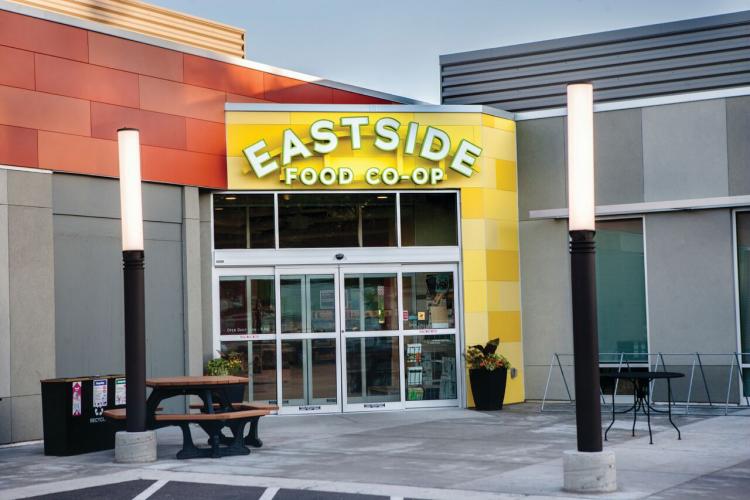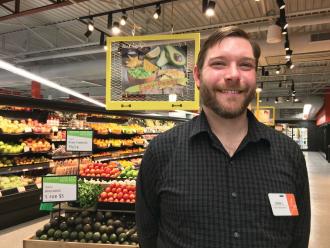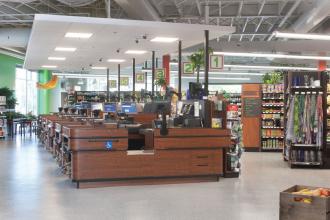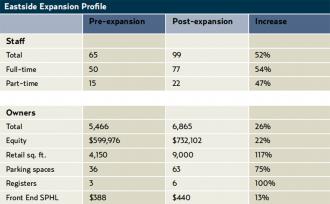Eastside Expansion




Eastside Food Co-op opened its doors to the community of Northeast Minneapolis in December 2003, with first-year sales of $2 million. Eastside’s early years proved to be quite challenging, and the debt load was heavy. Through perseverance and much hard work, the co-op, led by Amy Fields, the general manager during its first 13 years, was able to grow sales and net earnings. By 2012, Eastside was planning for expansion, and the co-op’s strong growth has continued throughout that process.
Fields planned and led a $6.5 million project in the co-op’s existing location that more than doubled the size of the sales floor and added 75 more parking spaces.
Raising the capital to fund this expansion turned out to be the mountain that stood in the way. I could tell you how to never give up when you have a compelling vision of your future, how to effectively leverage the partnerships that you have built in your community, or how to identify pools of money and go after them. (See sidebar on the Northeast Investment Cooperative.) But those aren’t the stories that I’m best able to share.
What I am uniquely able to talk about is what it’s like to have a construction zone just a sheet of plastic away from an open grocery store. It’s no surprise that operating a store for a little over a year while construction is happening all around you is challenging. This is particularly true for the face and voice of the store: the front-end cashiers, baggers, customer service workers, and shift leads. My story highlights how the co-op’s front end met these challenges and simultaneously delivered excellent service and upheld staff morale.
We broke ground on our project in late June of 2015 and opened the fully expanded store to customers on July 12, 2016. Looking back on this year, our front end was strongly tested yet managed to thrive. What follows are some of our key takeaways.
Keep your heads up
In stressful times, our tendency is to go all turtle. We look inward, focus on our particular areas of control, and hope that we can weather the storm. Our front-end management team helped me identify the importance of keeping our heads up during these times of stress. Julie Engle, front-end manager, and Rex Vogen, front-end assistant manager, had this to say:
“The key to keeping your head up when things are getting chaotic is to put your focus on the big picture, on building morale, and on fostering a positive attitude throughout the store. The front end has lots of task-oriented systems that need to be effectively run, as does the store in general.
“When a construction project or other period of intense change leads to responsibilities changing hands or old systems no longer being adequate (circumstances that often arise with little to no warning), having all of your energy invested in maintaining these now-antiquated systems will lead to frustration for department managers and staff members alike.
“Get ready to be flexible; have a sense of humor about what’s going on around you; be honest that there’s going to be change and that there’s going to be a lot of playing-by-ear; act with grace and compassion when things get hard; remember that it’s okay to use ad hoc procedures until the store has a chance to get its feet back under it; and, perhaps most importantly, take every genuine chance to let staff know how awesome, resilient, and expert they are.”
Manage your management
Let’s face it: whereas watching an excavator smash down the eyesore of a building that you have been forced to stare at forever is everything that you could imagine, construction in general kind of sucks. For project leaders, my recommendation to “manage your management” is NOT to micromanage your group of managers. It is to craft the way that you manage others. Rex and Julie were very intentional in managing the stress resulting from construction and their employees’ perception of how this stress was affecting their work.
“Julie and I acted as each other’s support. Change doesn’t always feel good, even when the end result is exciting. Customers are going to complain to cashiers, grocery and produce stockers, wellness staff, and just about anyone else who they can get to listen for even a minute. In turn, these co-op staff members are going to complain to their managers. The frustrations that floor staff feel are only going to be compounded by the unique challenges that you face when running a department during a period of great change. For this reason alone, it’s important that managers and assistant managers can vent with one another and come back to work refreshed and ready to do good.
“Live the motto, ‘Catch people doing good.’ It makes a world of difference when people get recognition for their hard work, and this recognition can help mitigate some of the frustration. Recognition doesn’t stop at your department. It should come up wherever you see it throughout the store.
“How you hire is also important to how you manage your department. When onboarding a new staff person, be honest about the situation your store is in. Instill a sense of humor and grace as both the attitude of the department and an expectation of how to handle situations as they come. Finally, let them know that they were hired because you thought that they could handle working in a business that is in a state of transition—give them a reason to take pride in their ability to manage change.”
Sometimes you have to close the store
Before I started my work in food co-ops, I worked at a historic nightclub in Minneapolis, First Avenue. There’s something to be said about watching a rock legend stand on a stage and feeling the first kick of the bass drum ripple through your body as you stand next to a giant speaker. I’ll gladly spend money on a night of enjoying this experience.
The same cannot be said about watching a construction worker hoist his belly onto a jackhammer while hearing and smelling a two-stroke diesel backhoe trench inside of your building for your new plumbing lines. Sometimes you have to close the store. Just do it. Your customers will be upset that you aren’t open, but they’ll be more upset if you put them through a terrible shopping experience, and they are more likely to tell other people about that.
Marketing + front end = best friends forever
We knew that much of our success would rely on our ability to effectively communicate ever-changing information to our shoppers. We went from 36 to 14 parking spaces, guided people down what resembled a cattle chute, completed overnight resets, moved our entrance and receiving doors on several occasions, and just generally did everything that we could to disrupt a normal shopping and working experience.
Julie and Rex found that developing a strong relationship with the marketing department was critical during this time.
“Your relationship with your marketing department should have a foundation of trust. This trust will allow you to have open, honest, face-to-face communication. The marketing department needs to trust that the front end knows the sales floor and the needs of the customers. If the front end tells marketing that they need a sign, marketing should be working on making that sign. Likewise, the front end understands its role as the face of the co-op. As such, it listens and trusts the marketing department when executing plans. Expect to interrupt each other throughout the workday, and find ways to say, ‘Yes.’”
Keep it fun
Fun has always been very important to us at Eastside Food Co-op. Our brand manager, Priya Niskodé-Backos, has included fun in our brand image. Our front end did a great job of keeping it fun even during the most stressful of times. When providing customer-service training, I always highlight the importance of doing the simplest thing—smile! Rex, Julie, and the rest of the front end staff kept people smiling.
“Make opportunities to be a goof. We love dancing on the sales floor, having fun conversations, and making opportunities to laugh, all while giving great customer service. Our front end controls the music that plays over the loudspeakers. Picking out something appropriately fun or soothing can make all the difference. If the front end folk know how to work hard and have fun while doing it, it makes customers feel good about the experience, and people from other departments feel pride about the place they work.”
There are many other amazing ways that Eastside’s staff, and particularly the front end, made our expansion project so successful. We focused on the basics, let people grieve about how awful things were, used unique ways of providing communication—remember that almost all of your staff carry computers in their pockets—and celebrated wins, successes, and for making it through difficult shifts.
We sustained sales growth during our entire expansion project: FY2016 growth was 10.7 percent. I attribute this growth to the great job that all of our staff did during this year of disruption. Eastside Food Co-op is on track to finish FY2017 with $14 million in sales—45 percent growth.
We had a ton of help from a lot of people—we really are showing what cooperation among cooperatives can achieve—but we want to especially acknowledge the important role that our board of directors and other engaged co-op owners played in the ability for us to better meet the needs of the community we serve. With dedicated staff and engaged owners, we definitely have the ability to shape a tomorrow that more closely matches our ideals. ♦
Northeast investment Co-op Boosts Local Economy [SIDEBAR]
A noteworthy extension of Eastside Food Co-op’s successful growth is the Northeast Investment Cooperative (NEIC). Eastside board members and former General Manager Amy Fields were instrumental in forming the NEIC, which describes itself as the nation’s first commercial-property investment cooperative: learn more at www.neic.coop.
Incorporated in late 2011, NEIC now has over 200 member-owners who are investing in their neighborhood. The cooperative looks for underutilized property in its community and raises capital from community members to buy and rehab commercial and residential property to improve the local economy. Its website states, “NEIC is committed to operating in a way that achieves the multiple bottom lines of sustainable economic development, local ownership of community assets, and a modest return on members’ investment.”
Its first property, across the street from Eastside Food Co-op, is home to Fair State Brewing Cooperative and Aki’s Breadhaus, which opened in 2014.
PHOTO:
Live the motto, “Catch people doing good.” It makes a world of difference when people get recognition for their hard work, and this recognition can help mitigate some of the frustration.
TABLE: Eastside Expansion







